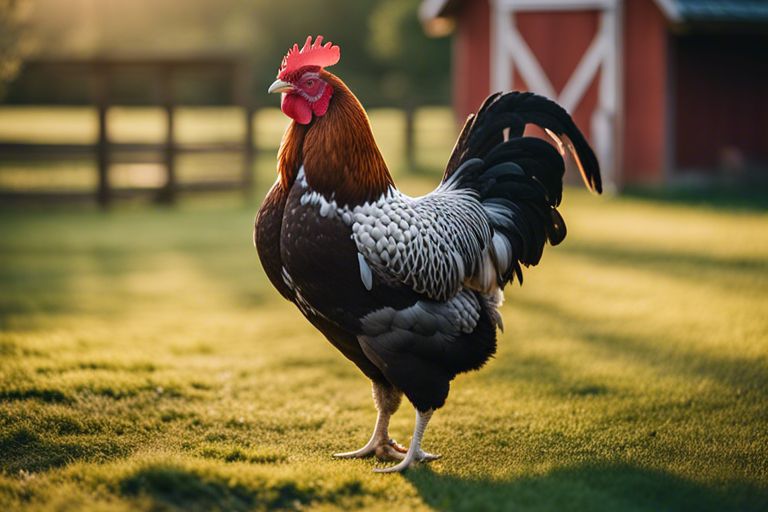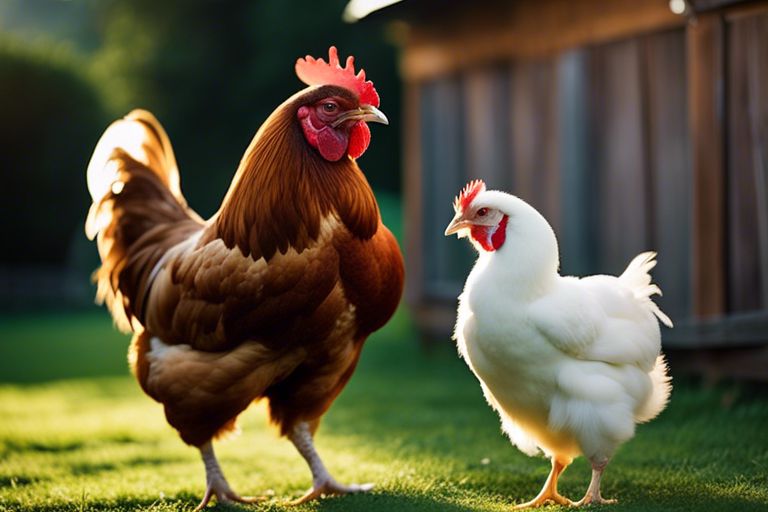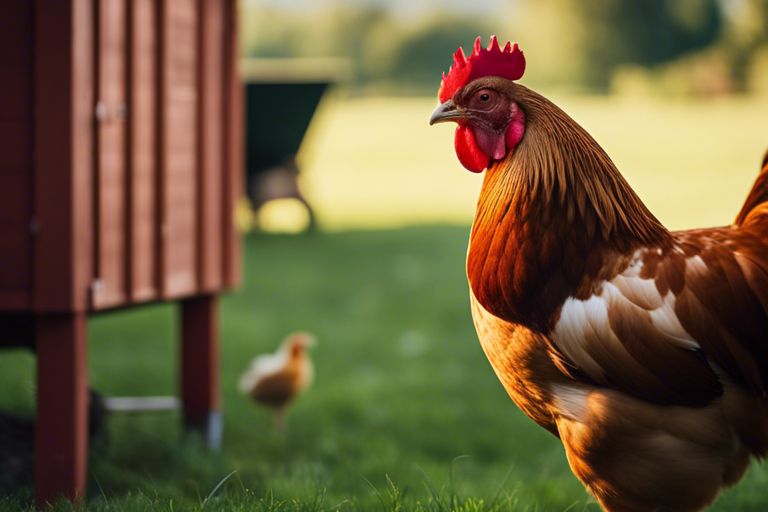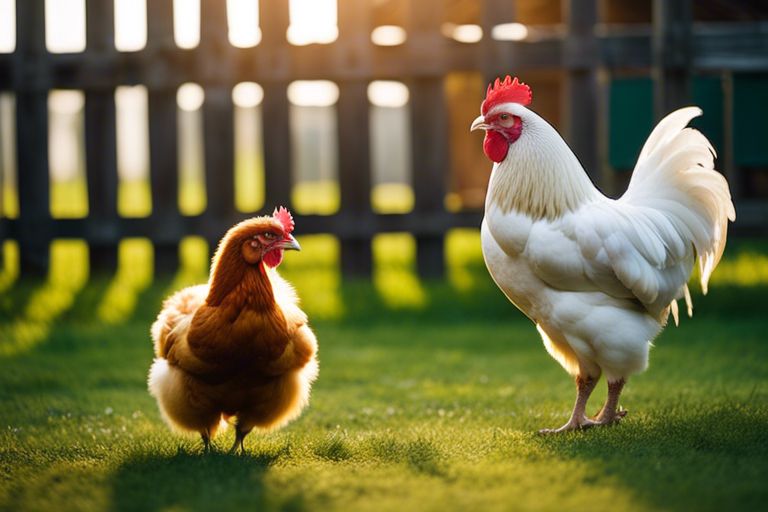You may have heard of hybrid and purebred chicken breeds, but do you know the real differences between them? In the world of poultry, understanding the distinctions between these two types of chickens is crucial for making informed decisions about your flock. This informative blog post will explore the characteristics, benefits, and considerations of hybrid and purebred chicken breeds, shedding light on what sets them apart in terms of appearance, behavior, egg production, and more. Whether you’re a seasoned chicken keeper or just starting out, gaining insight into these breeds will help you choose the right chickens for your needs.

Characteristics of Purebred Chickens
Breeding and Pedigree
Before delving into the characteristics of purebred chickens, it’s vital to understand the significance of breeding and pedigree in maintaining their purity. Purebred chickens are the result of careful and selective breeding over generations to preserve specific traits, such as size, color, egg production, and temperament. Pedigree records are meticulously kept to ensure the integrity of the bloodline and to track the ancestry of each bird.
Common Purebred Chicken Breeds
Breeds
For instance, some of the most popular purebred chicken breeds include the Rhode Island Red, Leghorn, Australorp, Orpington, and Plymouth Rock. Each breed has distinctive characteristics in terms of appearance, egg color, temperament, and purpose. The Rhode Island Red is known for its excellent egg-laying abilities, while the Orpington is prized for its dual-purpose as a meat and egg-producing breed. Understanding the unique traits of common purebred chicken breeds can help poultry enthusiasts choose the right breed for their specific needs.
Characteristics of Hybrid Chickens
The Creation Process of Hybrid Chickens
If you’ve ever wondered how hybrid chickens are created, the process involves crossing two different purebred chicken breeds. This intentional breeding results in offspring that possess desirable traits from both parent breeds.
Advantages of Hybrid Chickens in Farming
Hybrid chickens offer several advantages for farmers, including increased egg production, better disease resistance, and overall hardiness. These traits are crucial for maintaining a successful poultry farming operation.
More about Advantages of Hybrid Chickens in Farming
This allows for a more efficient and productive farm, as hybrid chickens tend to mature faster and have a higher feed conversion ratio. Additionally, their hybrid vigor often results in better overall health and resilience to common poultry diseases.

Performance and Productivity Analysis
Egg Production Comparisons
For those considering chicken breeds for egg production, understanding the differences between hybrid and purebred chickens is crucial. Here is a comparison of egg production between the two:
| Hybrid Chicken Breeds | Purebred Chicken Breeds |
|---|---|
| Higher egg production rates | Lower egg production rates |
| Consistent egg size and quality | Egg size and quality may vary |
| Tend to lay more eggs in their first year | May have a longer laying period |
Health and Disease Resistance
To ensure the health and longevity of your flock, understanding the health and disease resistance differences between hybrid and purebred chickens is imperative. Purebred chickens are known for their stronger natural immunity and resistance to certain diseases compared to hybrid breeds. However, hybrids may exhibit hybrid vigor, which can enhance overall health and disease resistance.
Production
In terms of egg production and overall performance, both hybrid and purebred chicken breeds have their strengths and weaknesses. It ultimately depends on your specific needs and priorities as a poultry owner. Consider factors such as egg production rates, health and disease resistance, and overall temperament when deciding between hybrid and purebred chickens for your flock.

Economic and Environmental Considerations
Cost-Effectiveness for Farmers
Economic considerations play a crucial role in determining whether hybrid or purebred chicken breeds are more cost-effective for farmers. Hybrid chickens are often preferred for their fast growth and high egg production rates, which can result in higher profits for farmers. On the other hand, purebred chickens may require more specialized care and have higher initial costs, but they can also be valuable for their unique traits and qualities.
Sustainability and Biodiversity Impacts
Another important aspect to consider when comparing hybrid and purebred chicken breeds is their impact on sustainability and biodiversity. Purebred chickens often have a long history and are valued for their genetic diversity, which can be important for maintaining healthy populations and preserving rare breeds. On the other hand, hybrid chickens may be more efficient in terms of resource utilization, which can have positive implications for sustainability in the long run.
Summing up
To wrap up, when comparing hybrid and purebred chicken breeds, it is important to consider factors such as hardiness, egg production, and temperament. Hybrid chickens are often preferred for their productivity and resilience, making them great for commercial farming. On the other hand, purebred chickens are valued for their distinct characteristics and qualities, making them popular among backyard breeders and enthusiasts. Ultimately, the choice between hybrid and purebred chicken breeds will depend on individual preferences, goals, and the specific needs of your flock. Both types of chickens have their own advantages and disadvantages, so it’s necessary to research and carefully consider which type will best suit your needs before making a decision.
FAQ
Q: What is the difference between hybrid and purebred chicken breeds?
A: Hybrid chicken breeds are a mix of two or more purebred chicken breeds, while purebred chicken breeds have ancestors of the same breed for several generations.
Q: What are the advantages of hybrid chicken breeds?
A: Hybrid chicken breeds often have higher egg production, better disease resistance, and faster growth rates compared to purebred chicken breeds.
Q: What are the advantages of purebred chicken breeds?
A: Purebred chicken breeds are valued for their specific traits like unique appearances, behavior, and breed standards. They are often used in shows and exhibitions.
Q: Are hybrid chicken breeds more cost-effective than purebred chicken breeds?
A: Yes, hybrid chicken breeds tend to be more cost-effective in terms of feed efficiency and production outputs such as eggs or meat.
Q: Which type of chicken breed is more suitable for beginners – hybrid or purebred?
A: Hybrid chicken breeds are often recommended for beginners as they are easier to care for, have higher productivity, and are more forgiving of mistakes in husbandry practices.
Q: Do hybrid chicken breeds have any disadvantages compared to purebred chicken breeds?
A: Hybrid chicken breeds may lack some of the characteristics and traits that purebred chicken breeds possess, such as specific color patterns or behaviors that are desirable to some breeders.
Q: Can hybrid and purebred chicken breeds be kept together in the same flock?
A: Yes, hybrid and purebred chicken breeds can be kept together in the same flock without any issues. However, breeders should monitor for any behavioral differences or conflicts that may arise.











